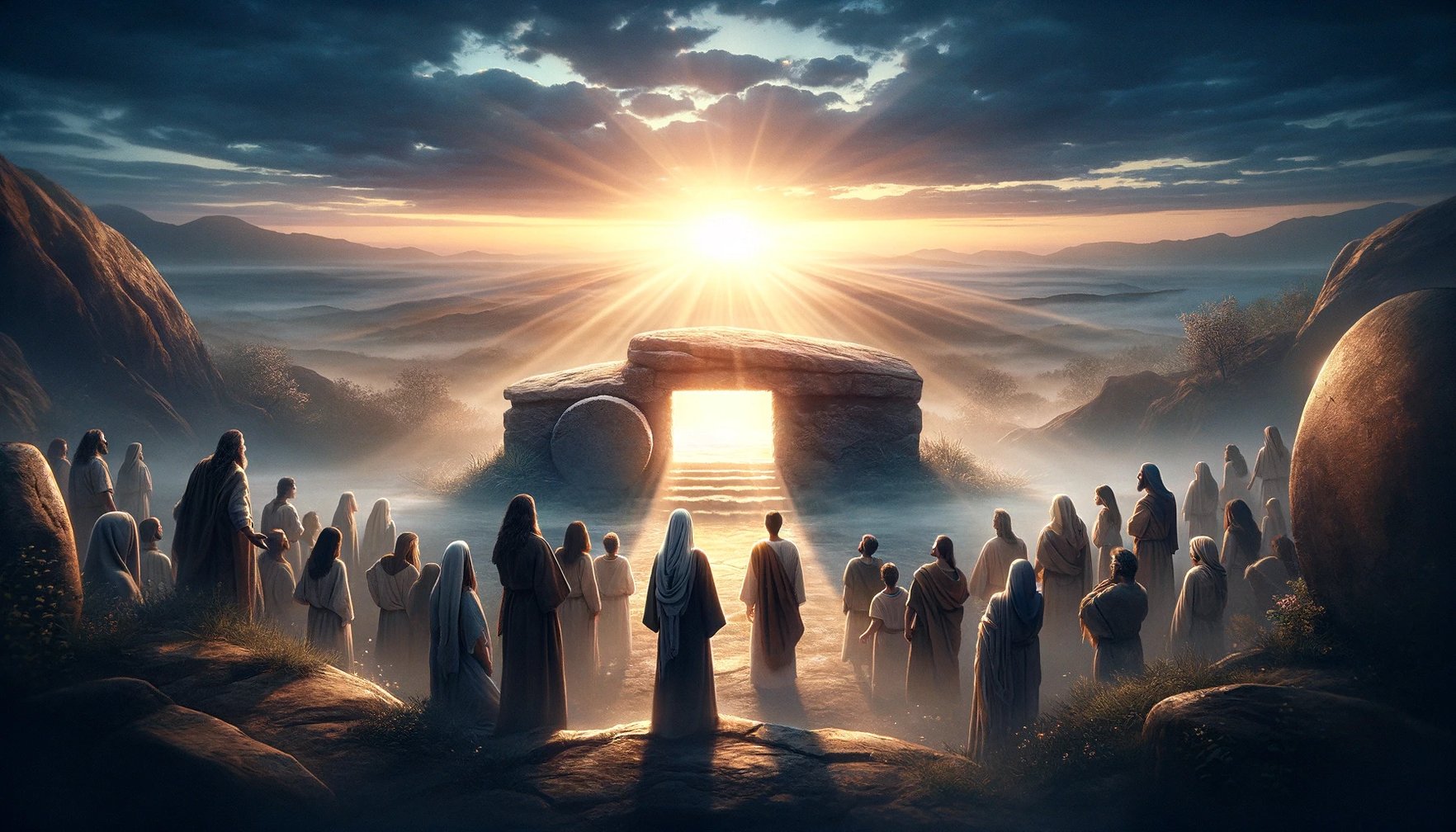Home>Christian Videos>Bible Stories>Why The Resurrection Of Jesus Christ Is Important


Bible Stories
Why The Resurrection Of Jesus Christ Is Important
Published: March 2, 2024
Jason DeRose, Managing Editor at Christian.net, uses his expertise in religion and journalism to deepen understanding of faith's societal impacts. His editorial leadership, coupled with a strong academic background, enriches the platform’s diverse content, earning him recognition in both journalism and religious circles.
Discover the significance of the resurrection of Jesus Christ in the Bible stories and its profound impact on Christian faith and salvation. Explore the importance of this pivotal event in Christianity.
(Many of the links in this article redirect to a specific reviewed product. Your purchase of these products through affiliate links helps to generate commission for Christian.net, at no extra cost. Learn more)
Table of Contents
The Historical Evidence of Jesus' Resurrection
-
Empty Tomb: The Gospels record that Jesus' tomb was found empty three days after his crucifixion. This fact is significant because if the tomb was not empty, Jesus' opponents could have easily disproved the resurrection claim by producing his body.
-
Post-Resurrection Appearances: According to the New Testament, Jesus appeared to numerous individuals and groups after his resurrection. These appearances were not limited to his followers but also to skeptics, such as James, the brother of Jesus, and Saul of Tarsus, who later became the apostle Paul.
-
Transformation of the Disciples: The disciples, who were initially fearful and in hiding after Jesus' crucifixion, underwent a radical transformation after they claimed to have seen the risen Jesus. They became bold proclaimers of the gospel, even in the face of persecution and martyrdom.
-
Early Christian Creeds: The early Christian creeds, as recorded in the New Testament, affirm the resurrection as a central tenet of the faith. These creeds date back to within a few years of Jesus' death, indicating that belief in his resurrection was not a later development.
-
Historical Testimony: Non-Christian sources, such as the Jewish historian Josephus and the Roman historian Tacitus, provide indirect but valuable corroboration of the basic facts surrounding Jesus' life, death, and the belief in his resurrection among early Christians.
-
Martyrdom of the Apostles: Many of Jesus' followers were willing to endure persecution and martyrdom for their belief in his resurrection. Their willingness to suffer and die for this conviction lends credibility to the historicity of the event.
-
Transformation of the Early Church: The rapid growth and spread of the Christian movement in the first century can be attributed, in part, to the proclamation of Jesus' resurrection. This historical impact is a compelling piece of evidence for the reality of the event.
In summary, the historical evidence for Jesus' resurrection is multifaceted and compelling. The combination of the empty tomb, post-resurrection appearances, transformation of the disciples, early Christian creeds, historical testimony, martyrdom of the apostles, and the transformation of the early church provides a strong case for the reality of this pivotal event in Christian belief.
The Theological Significance of Jesus' Resurrection
-
Victory Over Death: The resurrection of Jesus holds profound theological significance as it demonstrates his triumph over death. In Christian theology, death is seen as the consequence of sin, and Jesus' resurrection signifies the defeat of sin and the restoration of humanity's relationship with God. This victory over death provides hope for believers and reassurance of life beyond the grave.
-
Atonement and Redemption: The resurrection is intricately linked to the atonement and redemption of humanity. The apostle Paul writes in 1 Corinthians 15:17, "And if Christ has not been raised, your faith is futile; you are still in your sins." This underscores the theological necessity of Jesus' resurrection for the forgiveness of sins and the reconciliation of humanity with God.
-
Confirmation of Jesus' Identity: The resurrection serves as a divine vindication of Jesus' claims about himself. It validates his assertion of being the Son of God and the fulfillment of Messianic prophecies. The resurrection affirms Jesus' authority and divinity, establishing the foundation of Christian faith.
-
Assurance of Future Resurrection: The resurrection of Jesus provides assurance of the future resurrection of believers. In 1 Corinthians 15:20, Paul refers to Jesus as the "firstfruits of those who have fallen asleep," indicating that his resurrection paves the way for the resurrection of all who belong to him. This theological truth brings comfort and hope to Christians facing the reality of mortality.
-
Defeat of Spiritual Powers: The resurrection is also understood as a cosmic victory over spiritual powers and forces of evil. Colossians 2:15 describes how Jesus "disarmed the powers and authorities" through his death and resurrection, demonstrating his ultimate authority and sovereignty over all creation.
-
Transformation and New Life: The theological significance of Jesus' resurrection extends to the transformation and renewal of believers. Romans 6:4 speaks of being "raised to new life" through the power of Christ's resurrection, emphasizing the spiritual rebirth and the empowerment to live a life pleasing to God.
-
Hope for the World: The resurrection of Jesus offers hope for the renewal of the entire created order. Romans 8:11 speaks of the Spirit who raised Jesus from the dead also giving life to our mortal bodies, pointing to the ultimate restoration of all things in the new heavens and new earth.
In essence, the theological significance of Jesus' resurrection encompasses victory over death, atonement and redemption, confirmation of Jesus' identity, assurance of future resurrection, defeat of spiritual powers, transformation and new life, and hope for the world. These theological truths form the bedrock of Christian faith and have profound implications for believers' understanding of salvation and the purpose of human existence.
The Impact of Jesus' Resurrection on Christianity
-
Foundation of Faith: The resurrection of Jesus serves as the cornerstone of the Christian faith. Without this pivotal event, Christianity would lack its central tenet and the basis for the hope of salvation. The apostle Paul emphasizes in 1 Corinthians 15:14, "And if Christ has not been raised, our preaching is useless and so is your faith." The impact of Jesus' resurrection on Christianity is foundational, shaping the core beliefs and practices of the faith.
-
Transformation of Disciples: The resurrection of Jesus had a profound impact on his disciples and early followers. Their initial despair and fear were replaced by boldness and conviction after encountering the risen Christ. This transformation empowered them to spread the message of the gospel, leading to the establishment and growth of the early Christian community. The impact of Jesus' resurrection on Christianity is evident in the radical change it brought about in the lives of his followers.
-
Formation of Christian Identity: The resurrection of Jesus played a crucial role in shaping the identity of the Christian community. It affirmed the deity of Christ and solidified his authority as the Son of God. The early Christians identified themselves as followers of the resurrected Lord, and this identity continues to define Christian faith and practice. The impact of Jesus' resurrection on Christianity is seen in the formation of a distinct religious identity centered on the risen Christ.
-
Basis for Evangelism and Mission: The reality of Jesus' resurrection became the primary message proclaimed by the early church. The apostles and early believers bore witness to the transformative power of the resurrection, compelling others to embrace the Christian faith. The impact of Jesus' resurrection on Christianity is evident in its role as the driving force behind evangelism and the global spread of the gospel message.
-
Assurance of Salvation: The resurrection of Jesus provides assurance of salvation for believers. It signifies the victory over sin and death, offering hope for eternal life. The impact of Jesus' resurrection on Christianity is foundational to the assurance of redemption and the promise of resurrection for all who place their faith in Christ.
-
Historical and Theological Significance: The resurrection of Jesus holds both historical and theological significance for Christianity. Historically, it validates the claims of Jesus and the early Christian community, providing evidence for the truth of the gospel. Theologically, it underpins the doctrine of redemption and the hope of new life in Christ. The impact of Jesus' resurrection on Christianity is multifaceted, shaping both the historical narrative and the theological framework of the faith.
In summary, the impact of Jesus' resurrection on Christianity is profound and far-reaching. It serves as the foundation of faith, transforms the lives of believers, shapes Christian identity, drives evangelism and mission, assures salvation, and holds both historical and theological significance for the Christian faith. The resurrection of Jesus continues to be central to the identity and mission of the global Christian community.
The Hope and Assurance Provided by Jesus' Resurrection
-
Hope for Eternal Life: The resurrection of Jesus offers believers hope for eternal life. In John 11:25, Jesus declares, "I am the resurrection and the life. The one who believes in me will live, even though they die." This profound statement encapsulates the hope that stems from Jesus' resurrection – the assurance that death is not the end, but rather the gateway to an everlasting existence in the presence of God.
-
Victory Over Death: The resurrection provides assurance of victory over death for all who are in Christ. 1 Corinthians 15:54-55 proclaims, "Death has been swallowed up in victory… Thanks be to God! He gives us the victory through our Lord Jesus Christ." This victory over the grave instills confidence and assurance in the hearts of believers, knowing that the resurrection of Jesus secures their own triumph over mortality.
-
Comfort in Grief: The hope and assurance derived from Jesus' resurrection bring comfort to those who grieve. 1 Thessalonians 4:13-14 speaks to this, stating, "Brothers and sisters, we do not want you to be uninformed about those who sleep in death, so that you do not grieve like the rest of mankind, who have no hope. For we believe that Jesus died and rose again, and so we believe that God will bring with Jesus those who have fallen asleep in him." This passage underscores the comforting impact of Jesus' resurrection on those who mourn, offering solace and the promise of reunion with departed loved ones.
-
Assurance of Redemption: The resurrection of Jesus provides assurance of redemption and forgiveness of sins. Romans 4:25 affirms, "He was delivered over to death for our sins and was raised to life for our justification." This assurance of justification and reconciliation with God through the resurrection brings a profound sense of hope and security to believers, knowing that their sins have been atoned for through Christ's triumph over death.
-
Transformation and Renewal: The hope and assurance provided by Jesus' resurrection extend to the transformation and renewal of believers. 2 Corinthians 5:17 declares, "Therefore, if anyone is in Christ, the new creation has come: The old has gone, the new is here!" This promise of spiritual renewal and transformation through the power of the resurrected Christ instills hope and confidence in the possibility of a changed and purposeful life.
-
Confidence in God's Promises: The resurrection serves as a testament to the faithfulness of God's promises. Hebrews 6:19-20 describes it as "an anchor for the soul, firm and secure." The hope and assurance provided by Jesus' resurrection anchor believers in the unshakable faithfulness of God, reinforcing their confidence in His promises for both this life and the life to come.
In essence, the hope and assurance provided by Jesus' resurrection encompass hope for eternal life, victory over death, comfort in grief, assurance of redemption, transformation and renewal, and confidence in God's promises. These profound assurances form the bedrock of Christian faith, offering believers a steadfast and unwavering foundation for their hope and trust in the resurrected Christ.
The Relevance of Jesus' Resurrection in Today's World
-
Hope in the Midst of Uncertainty: In a world marked by uncertainty, fear, and rapid change, the resurrection of Jesus offers a timeless message of hope and stability. The assurance of life beyond the grave and the victory over death proclaimed through the resurrection speaks directly to the existential anxieties and uncertainties of modern society. In the face of global challenges, the relevance of Jesus' resurrection lies in its ability to provide enduring hope and assurance to individuals and communities grappling with the complexities of contemporary life.
-
Meaning and Purpose: The resurrection of Jesus addresses the fundamental human quest for meaning and purpose. In a secularized world where many struggle to find significance and direction, the message of Christ's resurrection offers a profound narrative of redemption, restoration, and the ultimate purpose of human existence. The relevance of Jesus' resurrection in today's world is evident in its capacity to speak to the deep longing for significance and fulfillment that permeates modern culture.
-
Ethical and Moral Framework: The resurrection of Jesus provides a robust ethical and moral framework for navigating the complexities of contemporary society. The values of love, forgiveness, justice, and sacrificial service exemplified in the life and resurrection of Jesus offer a timeless guide for ethical decision-making and social engagement. In a world marked by moral relativism and ethical ambiguity, the relevance of Jesus' resurrection lies in its capacity to provide a solid foundation for ethical discernment and action.
-
Healing and Wholeness: The message of Jesus' resurrection speaks directly to the human experience of brokenness, suffering, and the longing for healing. In a world marked by physical, emotional, and spiritual brokenness, the resurrection offers the promise of restoration, renewal, and ultimate healing. The relevance of Jesus' resurrection in today's world is seen in its ability to address the profound human need for wholeness and healing, offering a message of hope and transformation to individuals and societies grappling with various forms of brokenness.
-
Global Reconciliation and Unity: The resurrection of Jesus transcends cultural, ethnic, and national boundaries, offering a message of global reconciliation and unity. In a world marked by division, conflict, and polarization, the relevance of Jesus' resurrection lies in its capacity to bring diverse people together under the banner of a shared hope and common humanity. The message of reconciliation and unity proclaimed through the resurrection speaks directly to the pressing need for global solidarity and cooperation in addressing the complex challenges facing humanity.
In summary, the relevance of Jesus' resurrection in today's world is multifaceted and profound. It addresses the existential yearning for hope, provides a framework for meaning and purpose, offers an ethical and moral guide, speaks to the human need for healing and wholeness, and promotes global reconciliation and unity. The timeless message of the resurrection continues to resonate in the contemporary landscape, offering enduring relevance and significance to individuals and societies across the globe.















